
Read our 2023 annual report

Knowledge Hub
How innovation is helping mothers and babies in Kenya
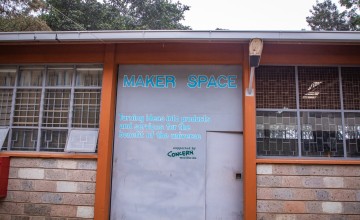
Innovating isn't always about re-inventing the wheel. Often it’s a case of looking at what’s already available and finding ways to make it more effective and more accessible. This is the spirit of innovation that is at the heart of our ‘Maker Movement’ project in Kenya, which aims to improve maternal and neonatal health throughout the country.
High mortality rates
Mothers and babies are dying unnecessarily in Kenya. Maternal and neonatal mortality rates in Kenya are far too high. According to Unicef, the current maternal mortality rate is at around 342 mothers dying per 100,000 live births. To put that into context, the rate in Ireland is approximately 5 maternal deaths per 100,000 live births.
The current neonatal mortality rate in Kenya is 19.6 babies per 1,000 live births. That means more than 19 babies out of every 1,000 born in Kenya do not survive. In Ireland, that figure is approximately 2.2 per 1,000 live births.
One of the major challenges in trying to improve outcomes for mothers and babies in Kenya is the acute shortage of necessary essential health equipment in hospitals and health facilities around the country. Equipment is not only expensive to purchase, it is also difficult to replace when it breaks. One of the common causes of equipment breakdown is overuse. And because spare parts are not available locally, they take too much time to procure, if they are available at all.
We simply cannot save the lives of mothers and babies if we don’t have the equipment we need to do so.
Avoiding unnecessary deaths
In order to tackle this critical shortage of equipment in Kenya we partnered with Kenyatta International Hospital and the University of Nairobi to launch the ‘Maker Movement for Maternal, Newborn & Child Health’ project in 2014. The project has the objective of developing low cost but highly effective medical devices, using local resources.
The University operates a FabLab (fabrication laboratory) which is one of about two hundred around the world. FabLabs, alternatively known as ‘Maker Spaces’ were conceived to provide an environment where skills, advanced materials and technologies could all be combined to make things quickly and cheaply anywhere in the world using digital design, 3D printers, laser cutting and other advanced technological means.
It’s within this ‘Maker Space’ that university students and project interns across a range of disciplines can work with doctors, nurses and other medical professionals from the hospital to find innovative design solutions to their medical equipment challenges.
Real progress
Initially project participants narrowed down nine devices considered to be the most urgent, and of those, prioritised and designed three. But with the project now near completion of its second phase, approximately ten designs have been developed to the point of becoming a viable prototype, and of those, five have so far been brought to the point of certification and are now ready for market.
Close to 150 students have come through the space in one way or another, often to contribute to hackathons or work on small projects. But at any one time, there are approximately 10 interns working full-time under the project.
Here we meet the makers and some of their designs.
The birthing cushion
Agnes Waita is a project engineer at the Maker Space. She explains the importance of the birthing cushion in encouraging mothers who are used to more traditional birthing methods to give birth in hospitals.
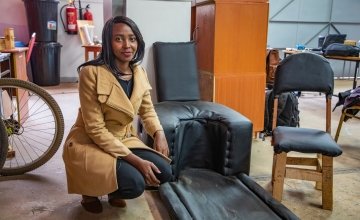
We wanted to encourage the mothers to go to the hospital to get better health care. This cushion helps them to maintain the position they’re familiar with while giving birth. It is an improvement from a previous design by UNICEF.
The suction machine
Steve Osumba is a Project Engineer at Maker Space. He explains the importance of their suction machine design.
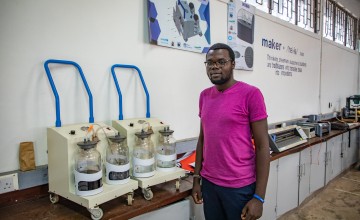
Choking on amniotic fluid is a major cause of death for new-born. These machines help in sucking out the fluids. There are usually only a few of these and they easily break down. So we co-created this particular product with the nurses and the people that actually repair them. It's a robust machine that works in terms of functionality, repairability and availability of spare parts.
The incubator
Elvis Ogweno is a biomedical engineer at the Maker Space. He explains why he and the team have chosen to develop their own incubators.
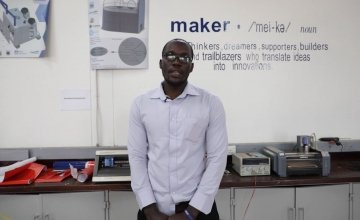
There are few incubators here in hospitals. You’ll find two babies in one incubator. Also, there is a lack of capacity in terms of repairing the machines and coming up with the spare parts when the machine breaks down. So this is why we are working on this, to make incubators and their spare parts readily available.
The phototherapy unit
Kista Mbula is project communications officer as well as being an innovator at the Maker Space. She explains the necessity for developing their own phototherapy unit.
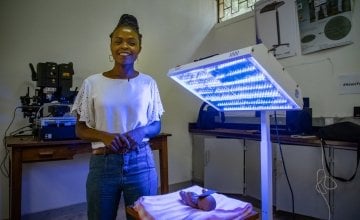
This unit is used in hospitals for babies who have jaundice. 65% of the children born worldwide have the condition of jaundice and 1 out of 10 require treatment through phototherapy. So the unit has been designed here in such a way that the components are locally and cheaply available to lower resource settings anywhere in our country and in Sub-Saharan Africa.
Bringing the innovations to market
The Maker Movement’s success since its 2014 launch has led to a number of new partnerships. Key amongst them is with the Philips foundation as it links the project to manufacturer who has the capacity to produce the equipment and make it available for local purchase.
In addition, the Maker Space has formed its own start-up which can produce the devices once they have received certification. Dr Richard Ayah is the Director of the Science and Technology Park within the University. He explains one of the key challenges they will face in terms of production.
The market has been starved, as it were, so we need to figure out what the true demand is. Remember that we are on a different path to other countries. This is a low resource setting so we have to figure out what the true demand is at this particular point.
The spirit of innovation
One of the many positive outcomes of this project is that the spirit of innovation that it is fostering will continue long beyond its eventual conclusion.
“The happy thing is that the students and interns who have come through this are now very marketable. So, I don't want to say we're losing them, but the world is gaining them, because of the training that they have undergone here”, says Dr Ayah.
Former interns have already gone on to create their own companies as a direct result of everything they learned under this project. And it’s only just the beginning.
Dr Ayah points out that new opportunities are constantly arising as a result of Concern’s approach to innovating within the project.
“Innovation by its very nature, obviously we should expect to fail. But a lot of donors or companies would expect you to succeed and not to fail… this is something that Concern has really supported us on.”
Creating the space to fail, learn and start again is key to successful innovating. Providing a space where this can happen has already been very beneficial for this Maker Space.
The partners who have come on board as a result of the capacity that has been built, I mean that has been a tremendous thing. Getting manufacturers to appreciate what needs to happen, getting policymakers to walk through the space… the Ministry of Labour have now designated us as their innovative hub for Assisstive technology for the region that is east Africa.
Maternal and neonatal mortality rates in Kenya will not transform overnight. But the more bright minds who are focused on solving the big issues, and the more support they have behind them, the more hope there is for better health outcomes for mothers and children around the country.
Support innovation around the globe
Innovation is central to all of our programmes. We are constantly searching for more effective and sustainable solutions to the problems faced by the communities we work with. You can support our innovation around the globe by donating today.





